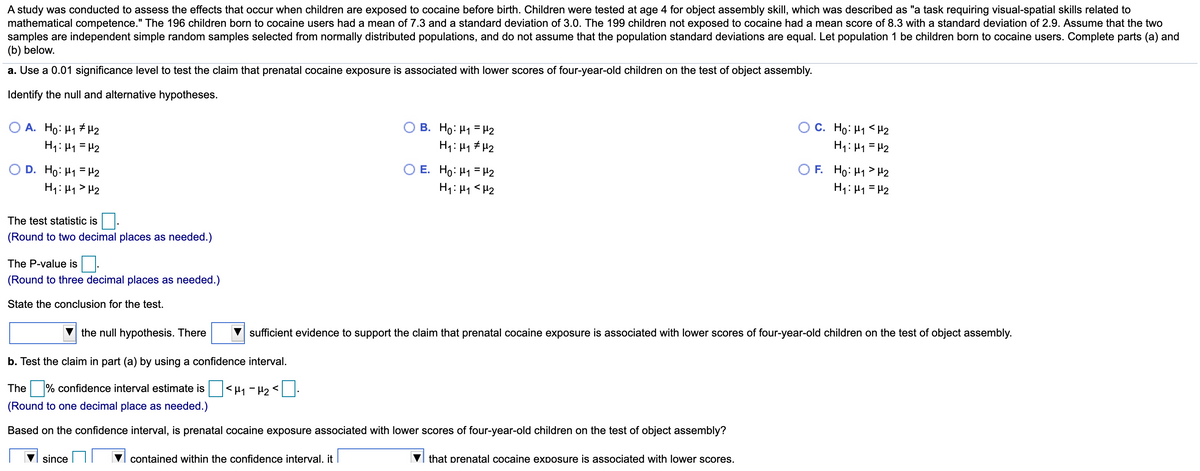A study was conducted to assess the effects that occur when children are exposed to cocaine before birth. Children were tested at age 4 for object assembly skill, which was described as "a task requiring visual-spatial skills related t mathematical competence." The 196 children born to cocaine users had a mean of 7.3 and a standard deviation of 3.0. The 199 children not exposed to cocaine had a mean score of 8.3 with a standard deviation of 2.9. Assume that samples are independent simple random samples selected from normally distributed populations, and do not assume that the population standard deviations are equal. Let population 1 be children born to cocaine users. Complete b) below. a. Use a 0.01 significance level to test the claim that prenatal cocaine exposure is associated with lower scores of four-year-old children on the test of object assembly. Identify the null and alternative hypotheses. O A. Ho: H1 * P2 O B. Ho: H1 =P2 OC. Ho: 1 H2 H: H1 =2 O D. Ho: H1 =H2 H: H
A study was conducted to assess the effects that occur when children are exposed to cocaine before birth. Children were tested at age 4 for object assembly skill, which was described as "a task requiring visual-spatial skills related t mathematical competence." The 196 children born to cocaine users had a mean of 7.3 and a standard deviation of 3.0. The 199 children not exposed to cocaine had a mean score of 8.3 with a standard deviation of 2.9. Assume that samples are independent simple random samples selected from normally distributed populations, and do not assume that the population standard deviations are equal. Let population 1 be children born to cocaine users. Complete b) below. a. Use a 0.01 significance level to test the claim that prenatal cocaine exposure is associated with lower scores of four-year-old children on the test of object assembly. Identify the null and alternative hypotheses. O A. Ho: H1 * P2 O B. Ho: H1 =P2 OC. Ho: 1 H2 H: H1 =2 O D. Ho: H1 =H2 H: H
Glencoe Algebra 1, Student Edition, 9780079039897, 0079039898, 2018
18th Edition
ISBN:9780079039897
Author:Carter
Publisher:Carter
Chapter10: Statistics
Section10.4: Distributions Of Data
Problem 19PFA
Related questions
Topic Video
Question

Transcribed Image Text:A study was conducted to assess the effects that occur when children are exposed to cocaine before birth. Children were tested at age 4 for object assembly skill, which was described as "a task requiring visual-spatial skills related to
mathematical competence." The 196 children born to cocaine users had a mean of 7.3 and a standard deviation of 3.0. The 199 children not exposed to cocaine had a mean score of 8.3 with a standard deviation of 2.9. Assume that the two
samples are independent simple random samples selected from normally distributed populations, and do not assume that the population standard deviations are equal. Let population 1 be children born to cocaine users. Complete parts (a) and
(b) below.
a. Use a 0.01 significance level to test the claim that prenatal cocaine exposure is associated with lower scores of four-year-old children on the test of object assembly.
Identify the null and alternative hypotheses.
O A. Ho: H1 # H2
H1: H1 = H2
O C. Ho: H1 < H2
H1: H1 = H2
B. Ho: H1 = H2
H1: 41 # H2
O D. Ho: H1 = H2
H1: H1> H2
F. Ho: H1 > H2
H1: 41 =H2
E. Ho: H1 = H2
H1: H1 <H2
The test statistic is
(Round to two decimal places as needed.)
The P-value is
(Round to three decimal places as needed.)
State the conclusion for the test.
the null hypothesis. There
sufficient evidence to support the claim that prenatal cocaine exposure is associated with lower scores of four-year-old children on the test of object assembly.
b. Test the claim in part (a) by using a confidence interval.
The
% confidence interval estimate is
<H1 -H2 <
(Round to one decimal place as needed.)
Based on the confidence interval, is prenatal cocaine exposure associated with lower scores of four-year-old children on the test of object assembly?
since
contained within the confidence interval. it
that prenatal cocaine exposure is associated with lower scores.
Expert Solution
This question has been solved!
Explore an expertly crafted, step-by-step solution for a thorough understanding of key concepts.
This is a popular solution!
Trending now
This is a popular solution!
Step by step
Solved in 4 steps

Knowledge Booster
Learn more about
Need a deep-dive on the concept behind this application? Look no further. Learn more about this topic, statistics and related others by exploring similar questions and additional content below.Recommended textbooks for you

Glencoe Algebra 1, Student Edition, 9780079039897…
Algebra
ISBN:
9780079039897
Author:
Carter
Publisher:
McGraw Hill

Glencoe Algebra 1, Student Edition, 9780079039897…
Algebra
ISBN:
9780079039897
Author:
Carter
Publisher:
McGraw Hill